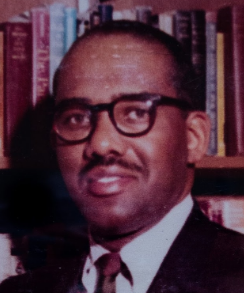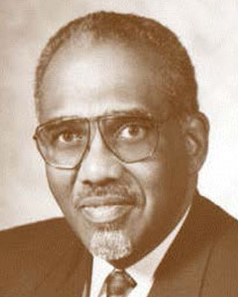Brother Samuel Berry McKinney Enters Omega Chapter -- Was Legendary Seattle-based Civil Rights Champ
Brother Rev. Dr. Samuel Berry McKinney entered Omega Chapter earlier today in his hometown of Seattle, Washington. In addition to the biographical details that will follow, the Editors would like to offer their sincere condolences to his Daughters Rhoda McKinney-Jones (Spelman Alumna) and Lora-Ellen McKinney, and his Alpha Rho nephew Wade Hampton McKinney IV (Fall 1981).
Reverend Samuel Berry McKinney served as pastor of Seattle's Mount Zion Baptist Church from 1958 until his retirement in 1998, and provided the longest continuous pastorship in the history of the church. (Mount Zion is located at 19th Avenue and E Madison Street.) Rev. McKinney was a civil rights leader as well as a minister and did much to shape the conscience of Seattle.
A Preacher's Son
McKinney was born in Flint, Michigan, on December 28, 1926, to Reverend Wade Hampton McKinney and Ruth Berry McKinney. Young McKinney grew up listening to his father preach, watching him fight discrimination in the Midwestern city, and hearing national leaders such as Thurgood Marshall, Walter White, and A. Philip Randolph speak at his father’s church.
Although he had every intention of becoming a civil rights lawyer when he enrolled at Morehouse College in Atlanta, Georgia, a deep inward drive propelled him into the ministry. After serving in the armed forces, he graduated from Morehouse in 1949 and went on to graduate from New York's Colgate Rochester Divinity School in 1952. He received his Doctor of Ministry Degree from the Colgate Rochester/Bexley Hall/Crozier Theological Seminaries (Rochester) in 1975. His book, Church Administration in the Black Perspective (co-authored with Floyd Massey) has gone through numerous printings.

Even though it was more than 70 years ago, Seattle legend Reverend Samuel B. McKinney can still remember the nickname he and his friends gave Martin Luther King Jr. during their days at Morehouse College. “We called him ‘Runt,” McKinney told me during our interview. Indeed, in 1944, when they first met, King couldn’t have been more than 5-foot-7. The soon-to-be-famous civil rights leader had started at Atlanta’s Morehouse College at the age of 15, thanks in large part to the state of Georgia’s educational system, which at the time allowed students to simply take a standardized test in order to skip a grade.
McKinney grew up in Cleveland and similar to King, was raised by an intense Baptist minister who did his best to challenge racism in America. “I had met him before going to Morehouse…at our parent’s religious conventions.” Their religious background was how the two young men bonded. Their entire childhood had been conquered by the world of religion. They had yet to form their own worldviews, but while away from their families they were beginning to rebel.
“We were both refugees hoping to escape an assembly of hot air. Sons of preachers all the time. We didn’t want to listen to all that stuff,” McKinney says.
At Morehouse, King attempted to flex his oratorical muscles by competing in speech contests. However, according to McKinney, “He didn’t win a single one of them.”
Mt. Zion Becomes a Major Force in the Community
Before assuming the pastorate at Mount Zion, Reverend McKinney served as pastor of Olney Street Baptist Church in Providence, R.I. When he arrived in Seattle, the congregation at the church at 19th Avenue and E Madison Street numbered 800. Forty years later, as a result of his leadership, the church had more than 2500 members, making it the largest black congregation in the state, a church where political candidates have found it compelling to make a stop. Thousands of people have been fed, clothed, counseled, and educated within the walls of the Mount Zion Baptist Church.
Early on, the community knew of his stance on human rights and civil rights because he caused his voice to be heard not only in the church but in high offices. He worked to sensitize the community to the needs of the less fortunate, both black and white. He soon became the voice of the black community.
In 1961, he convinced his college classmate and friend, Dr. Martin Luther King Jr. to come to Seattle for a speaking engagement. Arrangements were made at the First Presbyterian Church, but at the last minute the church cancelled the agreement. The Eagles Auditorium was engaged, and Dr. King spoke there on November 10, 1961, during his only Seattle visit. A reception followed at the Plymouth Congregational Church.
During the 1960s, Reverend McKinney’s civil rights commitment grew even stronger. He marched in the streets of Seattle and, along with the leaders of CORE, NAACP, and the Urban League, pushed for equal job, housing, and educational opportunities. With other black church leaders, he was arrested when protesting apartheid in front of the South African consul’s house. He marched with Dr. King in Washington, D.C. in 1963 and in Selma and Montgomery in 1965. In 1966, Reverend McKinney co-founded the Seattle Opportunity Industrialization Center (SOIC), a private, nonprofit, community-based vocational training center, and served as its first president and chief executive officer.
During his 40 years of leadership at Mount Zion, a new African-inspired sanctuary was built (1975), the first black Protestant church credit union in the Pacific Northwest was founded, a day care center and kindergarten were established, and a scholarship fund which annually awards $20,000 in academic scholarships was instituted. Another legacy is the Samuel Berry McKinney Manor built in 1998, across the street from the church. The residence has 64 units, 40 of which are for low-income residents.
Reverend McKinney was a founder of Liberty Bank, the first black-owned bank in Seattle and was the first black president of the Church Council of Greater Seattle. He has served on the board of the Meredith Mathews East Madison YMCA, the Fred Hutchinson Cancer Research Center, and the Washington Mutual Savings Bank. He is a 33rd degree Prince Hall Mason and a member of the Seattle Rotary, Alpha Phi Alpha Fraternity (Alpha Rho Chapter/Morehouse College Initiate), and Sigma Pi Phi Graduate Fraternity.


























